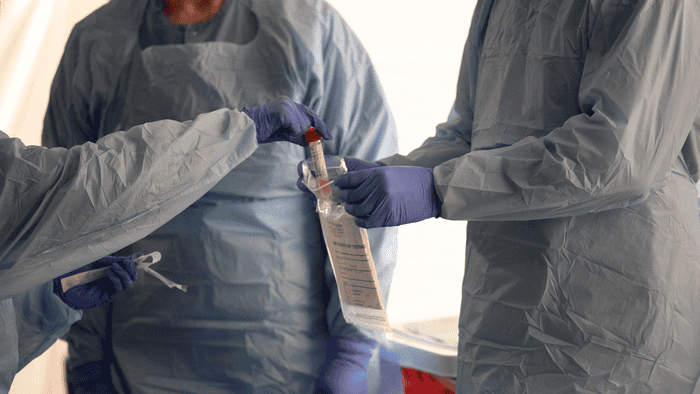
Jacob Glanville, a San Francisco doctor who was featured on the Netflix docuseries Pandemic, believes that he may have found a possible cure for the coronavirus.
Glanville's remedy is now set to be tested by the U.S. military. Specifically, the cure candidate will make its way to the U.S. Army Medical Research Institute of Infectious Disease to see if it actually works as stated and then, if it does, human trials can come at a later date.
Glanville runs the biotech company Distributed Bio, and on Wednesday he tweeted out some brief info about the antibody therapy which he says blocks "the novel coronavirus from infecting human cells."
“I’m happy to report that my team has successfully taken five antibodies that back in 2002 were determined to bind and neutralize, block and stop the SARS virus,” Glanville had said to the Radio New Zealand program Checkpoint, as reported by The New York Post. “We’ve evolved them in our laboratory, so now they very vigorously block and stop the SARS-CoV-2 [COVID-19] virus as well.”
Glanville also told the program that researchers created "hundreds of millions of versions" of an antibody for the old SARS virus and then "mutated them a bit" to find versions of those antibodies "that cross them over."
He further claims that this new treatment works by blocking the virus from "gain[ing] entry into your cells." Glanville said it's like a “short-term vaccine, except it works immediately.”
He says the treatment could be given to patients exhibiting COVID-19 symptoms and that, "within 20 minutes of receiving the shot," antibodies will fill their systems. It could also be useful as a preventative shot for people most likely to A) Be infected, and B) Face more serious consequences if they are infected.
“Those antibodies will surround and stick all over a virus and make it so it’s no longer infectious," Glanville said. "You could also give it to a doctor or a nurse or an elderly person and they would then have those antibodies in them that would prevent them from getting infected in the first place.”
Glanville said the downside is that the antibodies aren't like a true vaccine, in that they'll only protect those they're given to for a duration of about 8-10 weeks.
At the same time the military is set to conduct their tests, a separate lab will learn whether or not the medication is safe for people, according to Glanville. If tests turn out to be satisfactory, Glanville (and the pair of companies he's partnered with) will bump up production.
Human trials could start up around the end of summer.
“That’s a…trial where you give it to a series of 400 to 600 people who are in hospitals experiencing symptoms, and then you watch over the next five to 10 days to see whether it helped or not,” Glanville explained.
Best-case scenario, the drug could come out by September for compassionate use, which would mean it could be used on patients who aren't part of clinical trials.
